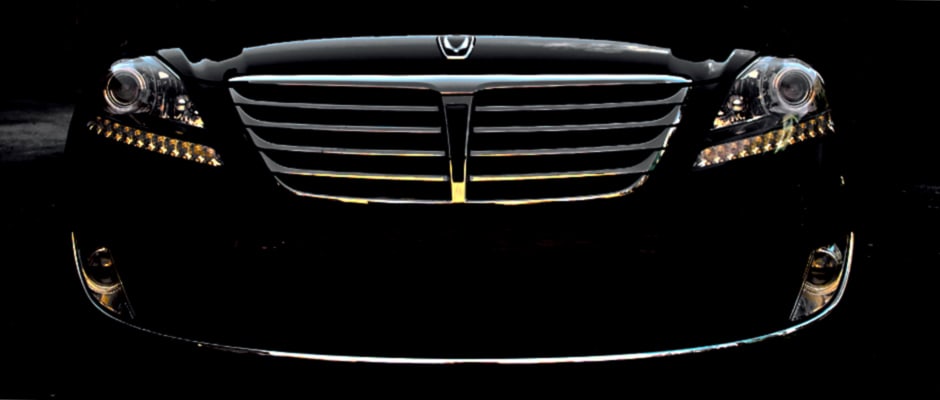After a week with a 2014 Hyundai Equus Ultimate (starting MSRP $61,000, as equipped $68,920) I can see why a young person would put in 80-hour weeks climbing the ladder at Daewoo or Doosan. Updated and upgraded for 2014, the Equus is a reward, an incentive, a leather-clad reminder of why you worked so hard in the first place.
{{brightcove '2745999193001'}}
In Korea, the Equus may be the tradeoff for decades of sweat equity, but in America it's shockingly easy to attain. Starting at $61,000 and fully-equipped at $68,920, the Equus is a relatively small indulgence as far as luxury sedans go. It also undercuts its main competitor—the Lexus LS460—by at least $10k. The exceptional Lexus is a better car, but only marginally: I'd venture to say that despite the lower price, the Hyundai offers 95 percent of the Lexus' luxury and refinement. Statistically speaking, the two cars are almost indistinguishable.
{{ gallery "exterior" }}
Look past that label
On the outside, the LS460's exterior may be unassuming, but the Equus' freshened sheetmetal just looks anonymous. For 2014, it got a slightly refreshed front and rear plus new side mirrors, and it still looks vaguely like an older Mercedes S-Class. I'm a fan of the Equus' attractive proportions, chiseled lines, and the new "turbine" wheels, but there are some definite misses: On the tester I drove, a front-view camera hanging from the grille was an unwelcome proboscis, and the winged badge was downright cryptozoological. The name itself will still make drama majors uneasy, and typographers might wonder why it's spelled out in a generic serif font.
Inside, both the Lexus and Hyundai are welcome sanctuaries, but the Equus lacks Lexus-level refinement. For instance, a maddening, small gap between panels interrupts the flow of the Equus' wooden dash, and a few hard plastic touch points cheapen the whole feel. Lexus has an excellent—albeit pricey—infotainment system, while Hyundai's lacks apps and internet connectivity. In fact, aside from an optional heads-up display, more customizable options, and standard BlueLink and Connected Care telematics services, the tech is nearly identical to what you could get in a well-equipped Elantra.
{{ gallery "tech" }}
Service is still a strong point for the Equus. Though owners don't get a free iPad anymore, they do get three years or 36,000 miles of free maintenance, and they never have to step foot in a dealership. Schedule maintenance or a repair through BlueLink and a valet will whisk your car from your home or office, replacing it with a complimentary loaner until your Equus is ready.
Fun to drive, fun to be driven
On the road, the Hyundai lacks the LS460's monumental sense of balance, but comes darn close. Plus, its 5.0-liter V8 is more powerful than Lexus' 4.6-liter mill, and won't protest if you mash the gas pedal. Instead, it'll hurtle the mighty Equus forward with the force of a siege weapon. If you're getting MPG figures in the mid-teens anyway, you might as well have some fun. That point goes for the Equus.
If you want to have real fun, you're going to want to be driven. Equipped with the Ultimate package's dual-screen rear-seat entertainment system and supremely comfortable heated, cooled, and reclining outboard seats, you may consider spending the money you saved by buying an Equus instead of a Lexus on a part-time chauffeur.
It's just that good. Press the appropriately-named "Relax" button and the front passenger seat will collapse, opening up more legroom than most airlines' business-class seats. Roll up the powered sunshades and nobody will know you're napping. Infotainment controls in the rear armrest mirror those up front, so you can give your driver directions just by entering an address in the nav system.
Of course, that assumes you've got a driver, or that your significant other doesn't mind when you doze in the backseat on long car trips. I suspect the majority of individual Equus buyers will skip the Ultimate option, while livery services and fleets will be glad to spring for a car with a luxurious backseat that's still a bargain.
{{ gallery "interior" }}
A psychological barrier
More importantly, airport car services also won't care about the relatively unknown Equus badge on the front of the car, and the pedestrian Hyundai one on the back. Part of the fun of driving a luxury car is announcing to the world that you've made it—or at least that you've made your latest monthly payment. The Equus telegraphs that you appreciate the finer things in life, but have reconciled your need to be coddled with a rational buying decision. Forgoing a high-end brand name just to save some cash requires some self-confidence, no matter how worthy a car is in its own right.
And, to be perfectly honest, that will be the ultimate compromise for most would-be Equus buyers. In Korea, an Equus is a status symbol. In the US, Hyundai's Elantra, Sonata, and Genesis stand out on their own merits, but the Equus needs some refinement before potential buyers (and, yes, automotive writers) stop comparing it to the LS 460. That's why Hyundai needs to make the next Equus truly exceptional. Even if the difference between an Equus and an LS460 is statistically insignificant, it matters to buyers.
Meet the tester
Keith was the Editor in Chief of Reviewed's appliance and automotive sites. His work has appeared in publications such as Wired, Car & Driver, and CityLab.
Checking our work.
Our team is here to help you buy the best stuff and love what you own. Our writers, editors, and experts obsess over the products we cover to make sure you're confident and satisfied. Have a different opinion about something we recommend? Email us and we'll compare notes.
Shoot us an email

